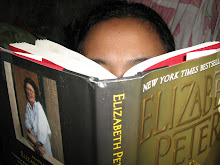Genesis: A writer was tasked to write an article on Language Month and came up with a piece advocating the use of Filipino alone, at the same time lambasting "misplaced regionalism" blaming it for "backwardness," "lack of unity" and "failure to progress." After getting my blood pressure back to normal-- and sending the article back with a few choice comments and a stern admonishment to do more research and rewrite the whole thing-- I wrote this piece in response.
* * *
Ask me what my native tongue is. I don't know what to answer. "Filipino" would be a safe answer. It's my country's national language, one I've been exhorted since childhood to love and master. But Filipino is not the first language I learned. I mastered English ahead of it, to the extent that I actually write and think in English, although I use Filipino for spoken communication.
I come from Mindanao, where Cebuano (or "Bisaya") is the lingua franca. Is it my native tongue? No, for I learned it in adolescence, when I had to go to college in a place where Cebuano was spoken.
I was born of Ilonggo parents, in a place where Hiligaynon is spoken. Is Hiligaynon my native tongue? You would expect the answer to be "yes." Hiligaynon is a language I speak almost by instinct when encountering a fellow Ilonggo.
Yet there is a memory of myself at age seven or eight, in elementary school. At the pump, after weeding in the school flower garden. Myself, saying "Hugas ta alima kag kahig." (Let's wash our hands and feet.) My classmates all bursting into laughter, ridiculing what I said (kahig in both Filipino and Hiligaynon refer to that motion chickens make when scratching the earth with their feet, although in Hiligaynon the stress is on the second syllable). "Alima kag kahig?" they asked. "What? It's kamot kag tiil. Say it. Kamot kag tiil. Not alima kag kahig." I did not know what to do-- at home we said "alima kag kahig" --but did as they said to keep the peace. I began listening to how they spoke and imitating it. And thus I lost my native tongue-- Karay-a.
My father was born in Pototan, my mother in Bugasong, Antique. It's not pronounced "an-teek" although that would be closer to its ancient name of Hamtik-- it's "an-tee-keh." We spoke Karay-a (also Kiniray-a or Kinaray-a) at home. It's only recently that Karay-a was established as a language in its own right-- for a long time, it was considered a cruder, more guttural variant of Hiligaynon, with its predominant "r" and "g" sounds where Hiligaynon used "d." Rugya, giya, rugto - diri, diya, didto - here, here, there. A friend of mine who went to college in Iloilo said some of her classmates ridiculed their classmates who were Karay-a speakers for their "quaint speech" and called them "mountain people" (uncivilized folk).
This also takes me back to a particular evening when I was still in college, traveling the 160-km journey home for the summer with my friends and townmates -- we often all went home together if we were from the same town or area because it was more fun and there was safety in numbers. In the van, on the last leg of our trip, there were two girls speaking in Filipino although with the local accent. After a while, one of the other passengers told them to speak in Hiligaynon because they were not in Manila. "It's obvious that you're not Ilonggo, you're in a place where Ilonggo is spoken, among fellow Ilonggos. Stop speaking Tagalog."
And yes, that accent. "Puntong Bisaya," they call it, although those conversant with the various Visayan languages will tell you that there is no generic "puntong Bisaya" because the accent varies with the language of the speaker.
Many people comment, upon hearing that I am actually not a Manila native, "but you don't have an accent!" I don't have one because I try to speak a language as correctly as possible, including its proper accents. Personally, I think that that "puntong Bisaya" isn't just about the speaker being unable to speak a language correctly. It's also a point of pride, of self-identification-- of saying that I may speak this language, but it is obviously not my native tongue. My native tongue is something else-- Cebuano, Hiligaynon, Waray, Karay-a, which I shall not abandon even though you insist I should use this so-called "national language." My fellow Cebuano, Ilonggo, Waray or Karay-a will be able to identify me because of this accent. Never mind that here, "Bisaya" is an insult, another synonym for "mountain people." I am proud of what I am, of where I'm from.
If I could go back to that moment in the schoolyard so many years ago, I would ask them why. Why should I forget my own language in order to embrace yours? If language is an integral part of my culture, why should I throw away what is mine? I can learn your language, but you must also respect that I have my own, and that it is part of who I am.
"Misplaced regionalism"? It all comes down to the perception that my culture should be considered as good as yours. Why should one cultural group out of all the hundred-plus cultural groups in this country be considered better than others? Why should its literature and culture, its language, its music, its history, be treated as more important than that of the hundred-plus others? If you want unity, can't we be united as equals?

* * *
Ask me what my native tongue is. I don't know what to answer. "Filipino" would be a safe answer. It's my country's national language, one I've been exhorted since childhood to love and master. But Filipino is not the first language I learned. I mastered English ahead of it, to the extent that I actually write and think in English, although I use Filipino for spoken communication.
I come from Mindanao, where Cebuano (or "Bisaya") is the lingua franca. Is it my native tongue? No, for I learned it in adolescence, when I had to go to college in a place where Cebuano was spoken.
I was born of Ilonggo parents, in a place where Hiligaynon is spoken. Is Hiligaynon my native tongue? You would expect the answer to be "yes." Hiligaynon is a language I speak almost by instinct when encountering a fellow Ilonggo.
Yet there is a memory of myself at age seven or eight, in elementary school. At the pump, after weeding in the school flower garden. Myself, saying "Hugas ta alima kag kahig." (Let's wash our hands and feet.) My classmates all bursting into laughter, ridiculing what I said (kahig in both Filipino and Hiligaynon refer to that motion chickens make when scratching the earth with their feet, although in Hiligaynon the stress is on the second syllable). "Alima kag kahig?" they asked. "What? It's kamot kag tiil. Say it. Kamot kag tiil. Not alima kag kahig." I did not know what to do-- at home we said "alima kag kahig" --but did as they said to keep the peace. I began listening to how they spoke and imitating it. And thus I lost my native tongue-- Karay-a.
My father was born in Pototan, my mother in Bugasong, Antique. It's not pronounced "an-teek" although that would be closer to its ancient name of Hamtik-- it's "an-tee-keh." We spoke Karay-a (also Kiniray-a or Kinaray-a) at home. It's only recently that Karay-a was established as a language in its own right-- for a long time, it was considered a cruder, more guttural variant of Hiligaynon, with its predominant "r" and "g" sounds where Hiligaynon used "d." Rugya, giya, rugto - diri, diya, didto - here, here, there. A friend of mine who went to college in Iloilo said some of her classmates ridiculed their classmates who were Karay-a speakers for their "quaint speech" and called them "mountain people" (uncivilized folk).
This also takes me back to a particular evening when I was still in college, traveling the 160-km journey home for the summer with my friends and townmates -- we often all went home together if we were from the same town or area because it was more fun and there was safety in numbers. In the van, on the last leg of our trip, there were two girls speaking in Filipino although with the local accent. After a while, one of the other passengers told them to speak in Hiligaynon because they were not in Manila. "It's obvious that you're not Ilonggo, you're in a place where Ilonggo is spoken, among fellow Ilonggos. Stop speaking Tagalog."
And yes, that accent. "Puntong Bisaya," they call it, although those conversant with the various Visayan languages will tell you that there is no generic "puntong Bisaya" because the accent varies with the language of the speaker.
Many people comment, upon hearing that I am actually not a Manila native, "but you don't have an accent!" I don't have one because I try to speak a language as correctly as possible, including its proper accents. Personally, I think that that "puntong Bisaya" isn't just about the speaker being unable to speak a language correctly. It's also a point of pride, of self-identification-- of saying that I may speak this language, but it is obviously not my native tongue. My native tongue is something else-- Cebuano, Hiligaynon, Waray, Karay-a, which I shall not abandon even though you insist I should use this so-called "national language." My fellow Cebuano, Ilonggo, Waray or Karay-a will be able to identify me because of this accent. Never mind that here, "Bisaya" is an insult, another synonym for "mountain people." I am proud of what I am, of where I'm from.
If I could go back to that moment in the schoolyard so many years ago, I would ask them why. Why should I forget my own language in order to embrace yours? If language is an integral part of my culture, why should I throw away what is mine? I can learn your language, but you must also respect that I have my own, and that it is part of who I am.
"Misplaced regionalism"? It all comes down to the perception that my culture should be considered as good as yours. Why should one cultural group out of all the hundred-plus cultural groups in this country be considered better than others? Why should its literature and culture, its language, its music, its history, be treated as more important than that of the hundred-plus others? If you want unity, can't we be united as equals?

This entry was posted
at Saturday, August 20, 2011
and is filed under
Filipino culture,
personal
. You can follow any responses to this entry through the
comments feed
.











